June 19, 2025 | 02:02 GMT +7
June 19, 2025 | 02:02 GMT +7
Hotline: 0913.378.918
June 19, 2025 | 02:02 GMT +7
Hotline: 0913.378.918
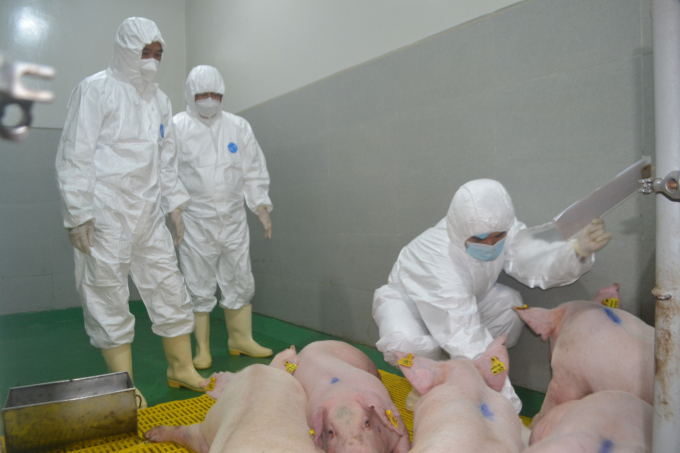
MARD Deputy Minister Phung Duc Tien (left) supervising the testing process. Photo: Tran Trung.
Mr. Tran Van Hanh, Deputy General Director of National Veterinary Joint Stock Company (NAVETCO), said that the African Swine Fever virus (ASFV) vaccine research project has achieved important scientific and practical results after a period of implementation. It was all thanks to the effective help of specialized units under the Department of Animal Health and the cooperation of Plum Island Animal Disease Center (PIADC) and NAVETCO.
The results show that the ASFV variant G-delta I 177L is safe in pigs when used at a dose 104 times higher than the minimum immune dose, giving 100% protection.
The vaccine variant’s probability to revert to virulence has also been tested with an outcome of six consecutive subcultures in pigs having no signs of ASF in all transfections, especially in generation V. The stability of virus variant G-delta I 177 L has been confirmed.
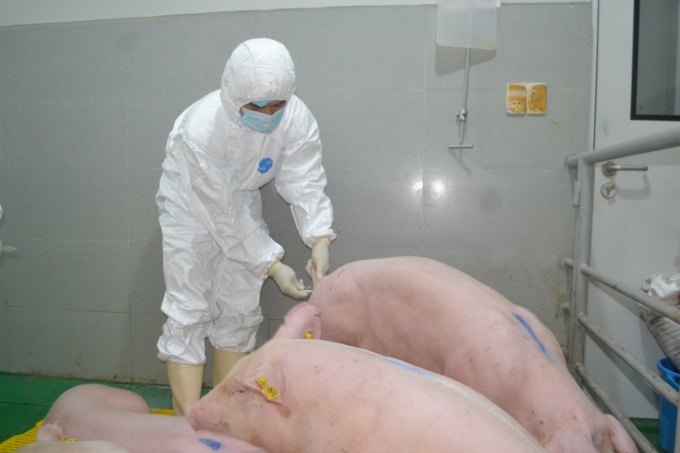
Epidemiological testing and clinical examination on tested pigs. Photo: Tran Trung.
The vaccine produced from this variant provides good protection through the virulence assessment method using a powerful ASFV variant isolated in Vietnam. Through the assessment, all six batches of experimental vaccines met the requirements:100% of vaccinated pigs has built up protection while 100% of control pigs died from the virulent ASFV.
The virus variant vaccine was recorded to possess good immunogenicity. Test results also proved that there exists protective antigen homology between the virus variant vaccine and the virulent virus circulating and causing ASF for pigs raised in Vietnam from 2019 to the present.
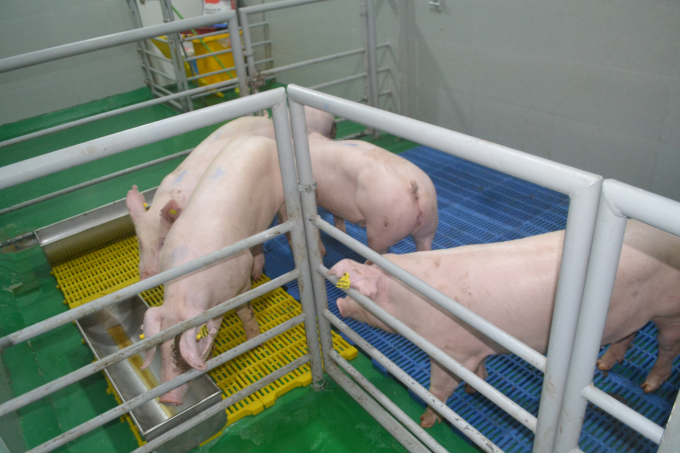
Results from the test showed that the vaccinated pigs remained healthy. Photo: Tran Trung.
"This test is the final step to submit to the National Science Council for approval before putting it into mass production. Results from the testing showed that the vaccinated pigs remained healthy after six consecutive days of positive results, while the unvaccinated control pigs showed clinical symptoms of infection and died. We have fully prepared human and material resources to immediately initiate the production upon approval," said Mr. Hanh.
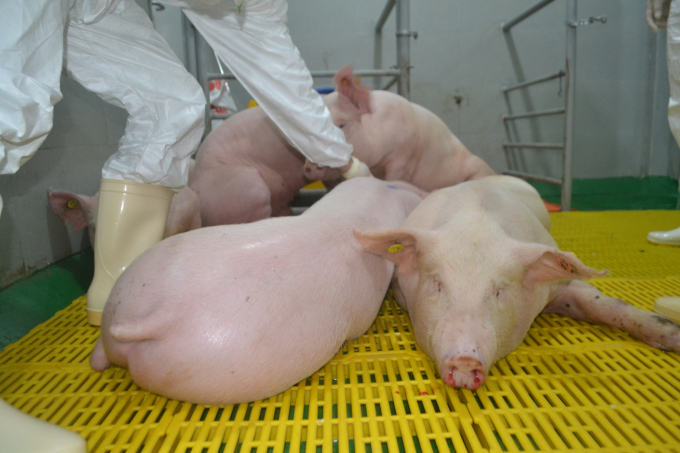
The unvaccinated control pigs showed clinical symptoms of infection and died. Photo: Tran Trung.
Assessing the test results, Deputy Minister of Agriculture and Rural Development Phung Duc Tien said, “Since importing the G-delta I 177 L virus variant from the US, the Ministry of Agriculture and Rural Development has drastic direction in the research process. Inspection and evaluation are carried out thoroughly, even including the establishment of a scientific council led by the Department of Animal Health and scientists.”
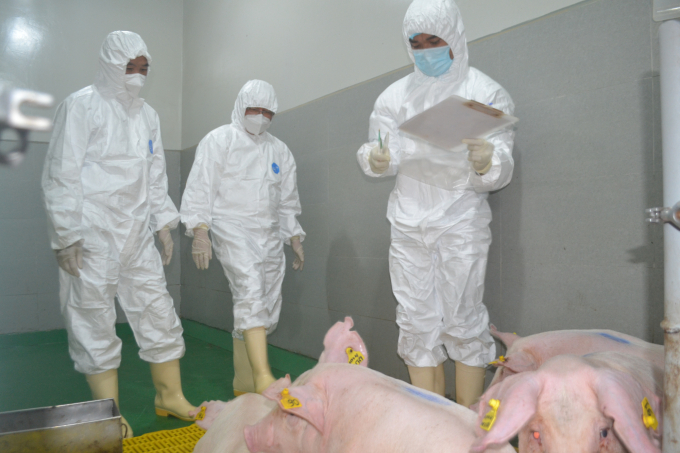
Deputy Minister Phung Duc Tien acknowledged the efforts of NAVETCO and the Department of Animal Health and highly appreciated the test results. Photo: Tran Trung.
Deputy Minister Phung Duc Tien believes that the National Science Council will soon approve the test results. The Ministry of Agriculture and Rural Development will direct the production of the ASFV vaccine to serve epidemic prevention.
It is to serve the near-100 million people in the country as well as consumers of export markets. Many businesses have currently invested in a closed chain from seed, feed, and standard breeding procedures to preliminary processing and processing on a high-modernity technology scale.
Translated by Samuel Pham
![Turning wind and rain into action: [9] Digitizing hydrometeorological data in response to climate change](https://t.ex-cdn.com/nongnghiepmoitruong.vn/608w/files/news/2025/06/17/z6704423696987_15fd32ffc26d590d204d520c9dac6786-nongnghiep-165943.jpg)
(VAN) Farmers have begun accessing hydrometeorological applications to adjust their cropping schedules, aiming to ensure productivity and adapt to climate change.
![Turning wind and rain into action: [8] Real-time salinity detection and early warning technology](https://t.ex-cdn.com/nongnghiepmoitruong.vn/608w/files/news/2025/06/17/z6704423696987_15fd32ffc26d590d204d520c9dac6786-nongnghiep-151127.jpg)
(VAN) Thanks to the integration of modern hydrological-hydraulic models, remote sensing technologies, and artificial intelligence, the accuracy of hydrological forecasting has significantly improved.
![Turning wind and rain into action: [7] Early disaster warnings help marine farmers minimize losses](https://t.ex-cdn.com/nongnghiepmoitruong.vn/608w/files/news/2025/06/17/z6704423696987_15fd32ffc26d590d204d520c9dac6786-nongnghiep-142942.jpg)
(VAN) In recent years, thanks to early disaster warnings and forecasting, marine farmers in Khanh Hoa province have been able to reduce risks and losses, thereby improving production efficiency.
![Turning wind and rain into action: [6] ‘Four on-the-spot’ disaster management software](https://t.ex-cdn.com/nongnghiepmoitruong.vn/608w/files/news/2025/06/17/e5a48259d6a262fc3bb3-nongnghiep-183800.jpg)
(VAN) By simply activating the scenario on the disaster management software, the relevant authorities immediately know how many households need to be evacuated, where to evacuate them to, and by what means of transportation…
![Turning wind and rain into action: [5] Hue applies modern technology in disaster forecasting](https://t.ex-cdn.com/nongnghiepmoitruong.vn/608w/files/news/2025/06/17/z6704423696987_15fd32ffc26d590d204d520c9dac6786-nongnghiep-093938.jpg)
(VAN) In Hue city, modern technology has recently been applied in meteorological and hydrological forecasting and warning, helping to reduce the damage caused by natural disasters.

(VAN) A cutting-edge farming technique being implemented on an experimental ranch in Arizona's Sonoran Desert has already saved a billion gallons of water over five years, according to Civil Eats.

(VAN) Poultry and pig production and the environment can be boosted through enhanced water technology, according to new research.